-
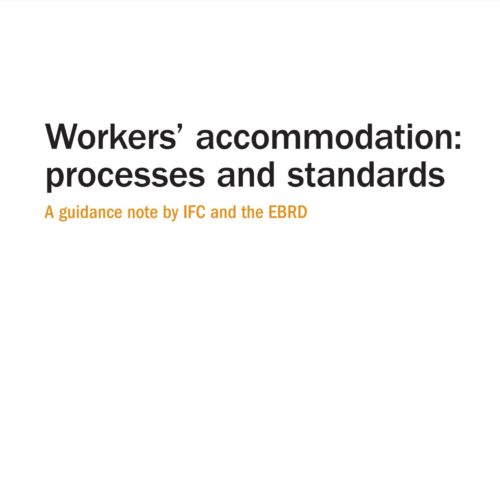 This Guidance Note is written by the EBRD, an international financial institution, and the IFC, a member of the World Bank Group, which creates opportunity for people to escape poverty and improve their lives. It is aimed at providing practical guidance to IFC and EBRD specialists, consultants and clients on the processes and standards that should be applied to the provision of workers’ accommodation in relation to projects funded by IFC or the EBRD. The Guidance Note also provides examples of good practice approaches that businesses have successfully applied in their operations.
This Guidance Note is written by the EBRD, an international financial institution, and the IFC, a member of the World Bank Group, which creates opportunity for people to escape poverty and improve their lives. It is aimed at providing practical guidance to IFC and EBRD specialists, consultants and clients on the processes and standards that should be applied to the provision of workers’ accommodation in relation to projects funded by IFC or the EBRD. The Guidance Note also provides examples of good practice approaches that businesses have successfully applied in their operations. -
 Polaris is a US-based anti-slavery NGO. They gather stories of survivors of human trafficking in different settings. The Typology of Modern Slavery they have created breaks down human trafficking into categories based on industry, providing solutions for tackling the crime based on the characteristics of each.
Polaris is a US-based anti-slavery NGO. They gather stories of survivors of human trafficking in different settings. The Typology of Modern Slavery they have created breaks down human trafficking into categories based on industry, providing solutions for tackling the crime based on the characteristics of each.Credit: Polaris Project
-
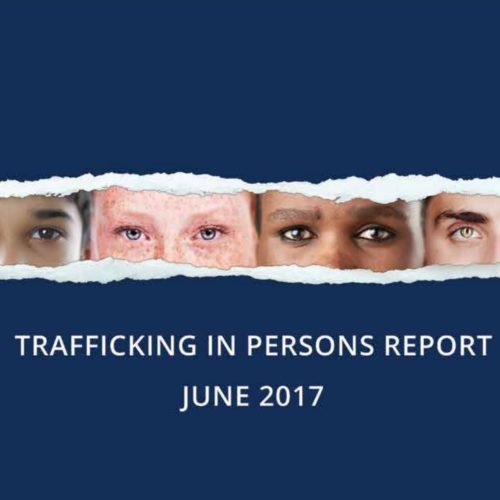 The Trafficking in Persons Report, or TIP Report, is an annual report issued by the U.S. State Department's Office to Monitor and Combat Trafficking in Persons. It provides countrywide statistics on Human Trafficking including definitions, themes and case studies. It ranks governments based on their perceived efforts to acknowledge and combat human trafficking.
The Trafficking in Persons Report, or TIP Report, is an annual report issued by the U.S. State Department's Office to Monitor and Combat Trafficking in Persons. It provides countrywide statistics on Human Trafficking including definitions, themes and case studies. It ranks governments based on their perceived efforts to acknowledge and combat human trafficking.Credit: United States of America Department of State
-
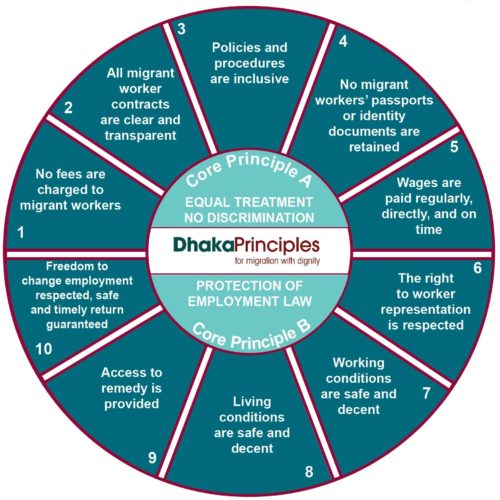 The Dhaka Principles provide a roadmap that traces a migrant worker from recruitment, through employment, to the end of contract. They provide key principles that employers and migrant recruiters should respect at each stage in the process to ensure migration with dignity.
The Dhaka Principles provide a roadmap that traces a migrant worker from recruitment, through employment, to the end of contract. They provide key principles that employers and migrant recruiters should respect at each stage in the process to ensure migration with dignity.Credit: Institute for Human Rights and Business
-
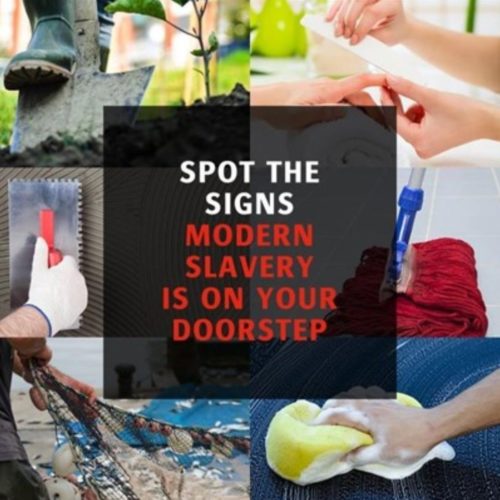 Crimestoppers is an independent charity helping law enforcement to locate criminals and help solve crimes. They have an anonymous 24/7 phone number (0800 555 111) that people can call to pass on information about crime. They are running a campaign to help people identify the signs of modern slavery and give specific information about the hospitality sector. The flyer about spotting the signs is in six languages.
Crimestoppers is an independent charity helping law enforcement to locate criminals and help solve crimes. They have an anonymous 24/7 phone number (0800 555 111) that people can call to pass on information about crime. They are running a campaign to help people identify the signs of modern slavery and give specific information about the hospitality sector. The flyer about spotting the signs is in six languages.Credit: Crimestoppers
-
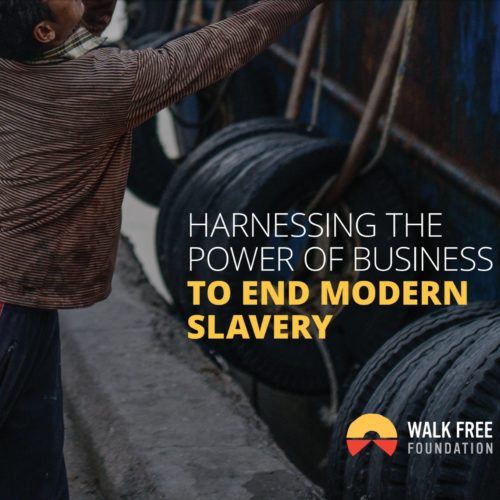 The Walk Free Foundation was established by Andrew Forrest, the Chairman of Fortescue Metals Group, after he found labour exploitation within his own supply chains and took a number of steps to prevent modern slavery affecting his business. This report provides an overview of modern slavery in a global context with statistics, case studies, and review of legislation and policy.
The Walk Free Foundation was established by Andrew Forrest, the Chairman of Fortescue Metals Group, after he found labour exploitation within his own supply chains and took a number of steps to prevent modern slavery affecting his business. This report provides an overview of modern slavery in a global context with statistics, case studies, and review of legislation and policy.Credit: Walk Free Foundation
-
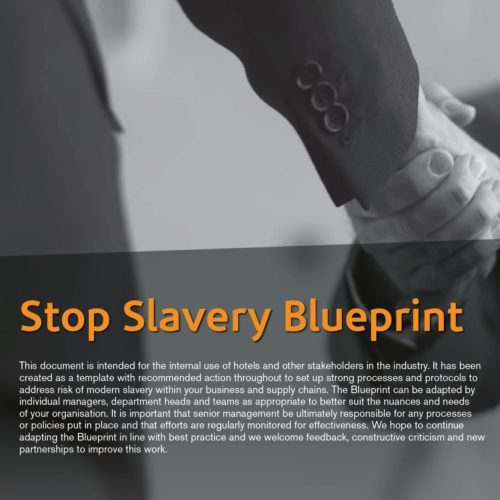 The Stop Slavery Blueprint has been created by Shiva Foundation and was initially trialled in a group of hotels, with its implementation coordinated and supported by the Foundation. The Blueprint sets out the key principles for hoteliers wishing to implement their own anti-slavery initiatives. It provides guidance and recommendations in the form of: • Policies and practices, • Procedures and protocols, and • A checklist of suggested actions. The Blueprint also sets out guidance on transparency, reporting, performance measurement, business partner engagement, risk assessment, business authentication, and investigation and remediation. It is meant to be used in conjunction with the Stop Slavery General Manager Handbook which provides practical guidance and materials.
The Stop Slavery Blueprint has been created by Shiva Foundation and was initially trialled in a group of hotels, with its implementation coordinated and supported by the Foundation. The Blueprint sets out the key principles for hoteliers wishing to implement their own anti-slavery initiatives. It provides guidance and recommendations in the form of: • Policies and practices, • Procedures and protocols, and • A checklist of suggested actions. The Blueprint also sets out guidance on transparency, reporting, performance measurement, business partner engagement, risk assessment, business authentication, and investigation and remediation. It is meant to be used in conjunction with the Stop Slavery General Manager Handbook which provides practical guidance and materials.Credit: Shiva Foundation
-
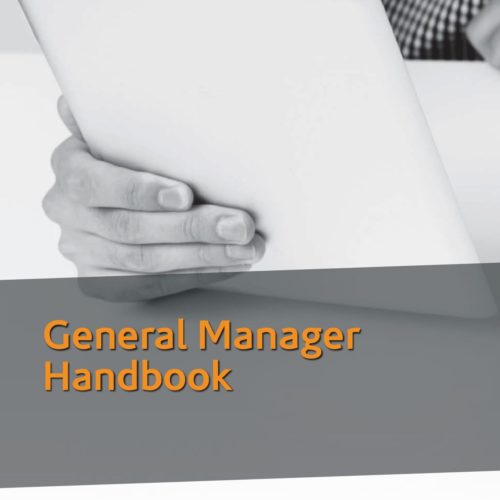 This Handbook is to be used by General Managers in conjunction with the Stop Slavery Blueprint. It offers practical tools to help operationalise the guidance from the Blueprint and provides example documents that can be adapted and used accordingly. The Stop Slavery Blueprint has been created by Shiva Foundation and was initially trialled in a group of hotels, with its implementation coordinated and supported by the Foundation. The Blueprint sets out the key principles for hoteliers wishing to implement their own anti-slavery initiatives.
This Handbook is to be used by General Managers in conjunction with the Stop Slavery Blueprint. It offers practical tools to help operationalise the guidance from the Blueprint and provides example documents that can be adapted and used accordingly. The Stop Slavery Blueprint has been created by Shiva Foundation and was initially trialled in a group of hotels, with its implementation coordinated and supported by the Foundation. The Blueprint sets out the key principles for hoteliers wishing to implement their own anti-slavery initiatives.Credit: Shiva Foundation
-
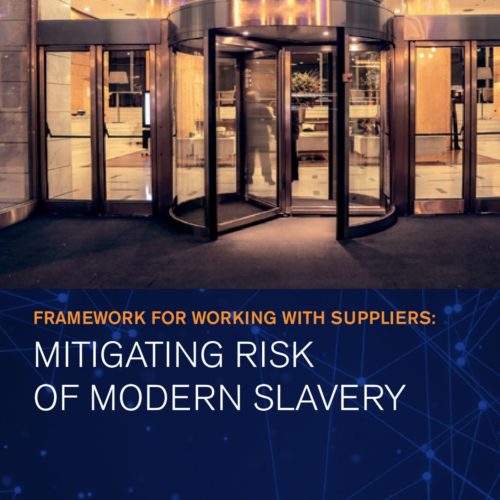 The Framework for Working with Suppliers: Mitigating Risk of Modern Slavery is a tool intended to be used by stakeholders at various levels of management within the hotel industry. It recommends specific responsibilities for brands, hotel owners and management companies, based on best practice and the experience and input of the Stop Slavery Hotel Industry Network (the "Network") membership. The Network brings together representatives from across the hotel industry to combat human trafficking and modern slavery within the sector. Its ethos stems from the acknowledgement that actors across the industry, whether international brands, bespoke hotel groups, independent owners, managers or employee agencies are all responsible for combating this horrific crime.
The Framework for Working with Suppliers: Mitigating Risk of Modern Slavery is a tool intended to be used by stakeholders at various levels of management within the hotel industry. It recommends specific responsibilities for brands, hotel owners and management companies, based on best practice and the experience and input of the Stop Slavery Hotel Industry Network (the "Network") membership. The Network brings together representatives from across the hotel industry to combat human trafficking and modern slavery within the sector. Its ethos stems from the acknowledgement that actors across the industry, whether international brands, bespoke hotel groups, independent owners, managers or employee agencies are all responsible for combating this horrific crime.Credit: Stop Slavery Hotel Industry Network
-
 Hedging Risk by Combating Human Trafficking: Insights from the Private Sector is designed to help companies share best practices so they can mitigate their risks and help eliminate this heinous practice. In this first of a series, we highlight insights and technology-driven interventions in the hospitality, finance, and transportation industries.
Hedging Risk by Combating Human Trafficking: Insights from the Private Sector is designed to help companies share best practices so they can mitigate their risks and help eliminate this heinous practice. In this first of a series, we highlight insights and technology-driven interventions in the hospitality, finance, and transportation industries.Credit: World Economic Forum
-
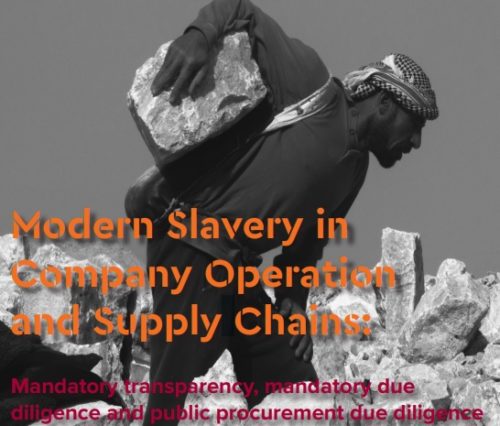 This paper sets out what leading governments are already doing to insist global business does more to eradicate modern slavery. It draws from this experience to set out how these uncoordinated actions could become a robust, and harmonised international standard for national legislation.
This paper sets out what leading governments are already doing to insist global business does more to eradicate modern slavery. It draws from this experience to set out how these uncoordinated actions could become a robust, and harmonised international standard for national legislation.Credit: ITUC and Business and Human Rights Resource Centre
-
 The Leadership Group for Responsible Recruitment calls for the implementation of the Employer Pays Principle which requires companies to commit to bearing the costs of recruitment. This short guide breaks down six steps companies should take to meet the commitment in practice.
The Leadership Group for Responsible Recruitment calls for the implementation of the Employer Pays Principle which requires companies to commit to bearing the costs of recruitment. This short guide breaks down six steps companies should take to meet the commitment in practice.Credit: Leadership Group for Responsible Recruitment
-
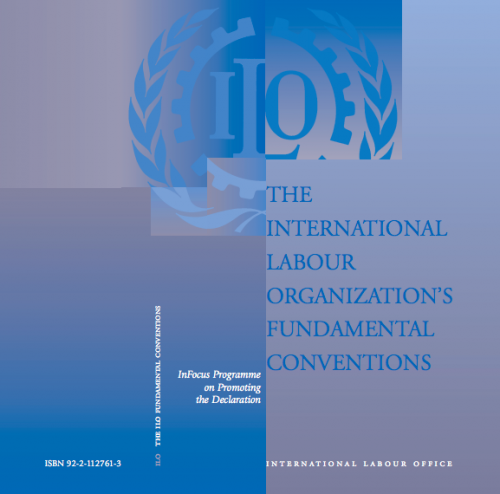 The ILO is the UN organisation responsible for setting and monitoring international labour standards. The ILO has identified eight conventions covering subjects they consider to be fundamental principles and rights at work. These are at times referred to as the core labour standards: ● Freedom of Association and Protection of the Right to Organise Convention, 1948 (No. 87) ● Right to Organise and Collective Bargaining Convention,1949 (No. 98) ● Forced Labour Convention, 1930 (No. 29) ● Abolition of Forced Labour Convention, 1957 (No. 105) ● Minimum Age Convention, 1973 (No. 138) ● Worst Forms of Child Labour Convention, 1999 (No. 182) ● Equal Remuneration Convention, 1951 (No. 100) ● Discrimination (Employment and Occupation) Convention, 1958 (No. 111)
The ILO is the UN organisation responsible for setting and monitoring international labour standards. The ILO has identified eight conventions covering subjects they consider to be fundamental principles and rights at work. These are at times referred to as the core labour standards: ● Freedom of Association and Protection of the Right to Organise Convention, 1948 (No. 87) ● Right to Organise and Collective Bargaining Convention,1949 (No. 98) ● Forced Labour Convention, 1930 (No. 29) ● Abolition of Forced Labour Convention, 1957 (No. 105) ● Minimum Age Convention, 1973 (No. 138) ● Worst Forms of Child Labour Convention, 1999 (No. 182) ● Equal Remuneration Convention, 1951 (No. 100) ● Discrimination (Employment and Occupation) Convention, 1958 (No. 111)Credit: Copyright © International Labour Organization, 2002
-
 This guide provides support for hotel owners to uphold and protect human rights in their business and understand risk areas. It includes information and case studies about risk areas, tools and instruments to help companies adhere to the law and implement good practice, and a step-by-step guide for companies to meet the responsibility to respect human rights.
This guide provides support for hotel owners to uphold and protect human rights in their business and understand risk areas. It includes information and case studies about risk areas, tools and instruments to help companies adhere to the law and implement good practice, and a step-by-step guide for companies to meet the responsibility to respect human rights.Credit: University of Liverpool
-
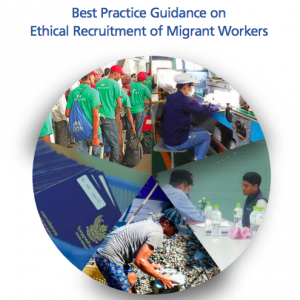 The ICCR is a coalition of faith-based investors. This guidance looks at emerging best practice trends in eight companies from high risk sectors, analysing their developments in corporate ethical recruitment policies and identifying gaps for improvement. The key learning points provided in the guidance can be used as a starting point for businesses to develop their own policies.
The ICCR is a coalition of faith-based investors. This guidance looks at emerging best practice trends in eight companies from high risk sectors, analysing their developments in corporate ethical recruitment policies and identifying gaps for improvement. The key learning points provided in the guidance can be used as a starting point for businesses to develop their own policies.Credit: Interfaith Center on Corporate Responsibility (ICCR)
-
 This is an analysis of modern slavery statements that focuses on changes in reporting and practice in addressing forced labour and human trafficking. It covers 150 sample companies across different sectors. It seeks to understand the quality and scope of reporting against the UK Modern Slavery Act’s transparency requirements set out in s. 54 as well as the accompanying guidance on recommended content published by the Home Office.
This is an analysis of modern slavery statements that focuses on changes in reporting and practice in addressing forced labour and human trafficking. It covers 150 sample companies across different sectors. It seeks to understand the quality and scope of reporting against the UK Modern Slavery Act’s transparency requirements set out in s. 54 as well as the accompanying guidance on recommended content published by the Home Office.Credit: Ergon Associates

